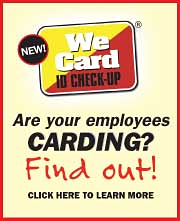Imagine you're at the register and a customer, who doesn't look much older than your kid brother, asks for a pack of cigarettes. You check his ID and sure enough he's too young, so you refuse the sale.
The teenager heads outside and starts talking to a person in a parked car. Next thing you know, the person is standing in front of you asking for the same brand the teenager just asked for.
Again, you do what you've been trained to do.
"I'm not allowed to sell you those cigarettes because it appears you're buying for a minor," you say.
So far so good, except the next morning you find yourself in trouble with your store manager. It turns out the man complained and your manager took his side.
This scenario played out in Tennessee not too long ago.
So was the sales associate right to refuse the sale?
Absolutely.
"It is unlawful to knowingly sell tobacco to someone who is purchasing the product for someone under eighteen years of age, but it would be difficult to prove," said Sherrie Kemp, of the Tennessee Department of Agriculture Regulatory Services Division.
"Hopefully most stores have a policy regarding third-party sales. The clerk was correct in refusing to sell the tobacco since she believed it was for a minor."
Forty-eight states prohibit adults from buying cigarettes for underage smokers and some states make it illegal for a retailer to sell tobacco products to someone who appears to be buying for a minor. (A handful of states have exceptions, providing limited authority to parents or guardians.)
Many stores train sales associates to identify customers who may be buying for a minor.
"We teach if you have reason to suspect the person is buying cigarettes with the intent to give them to a minor you should refuse the sale," said Jaron Springer, the president of the Tennessee Grocers and Convenience Store Association. "You have the right and civic obligation to refuse the sale."
Cigarette sales to minors are down and the Substance Abuse and Mental Health Services Administration reported that in 2007, for the first time, all states met their compliance targets. But large numbers of minors still get around the law by asking an older friend or relative to buy cigarettes for them.
According to a recent study, about 24 percent of underage smokers ages 15-17 obtained cigarettes from a third party who made the purchase for them. Some studies show that underage smokers often buy their cigarettes from other underage smokers who have purchased them illegally in stores. So the good news is that strict compliance with the ban against selling cigarettes to minors also reduces social access.
"When retail access of tobacco to minors is reduced, you cut off social access - because it cuts off the supply to others," said Susan Marsiglia, the coordinator of the Synar compliance program at SAMHSA.
It's one thing to rely on retailers to comply with laws against selling cigarettes to minors. But some in law enforcement say that it's too much to expect busy sales associates to make judgment calls about whether a customer of legal age is buying for himself or with the intent to distribute to a minor.
"I don't think you can put the burden on retailers," said Vanessa Mure, tobacco program manager with the Missouri Division of Alcohol and Tobacco. "I think it's unfair and unenforceable."
Linda McKenna, the lead trainer for We Card, said that retailers and enforcement agencies already expect a lot of sales associates.
"Put yourself behind that register and work a couple of single shifts and ask yourself what's really reasonable to ask these folks to do?" she said.
She recommends in-store signs that remind customers that it's against the law to distribute cigarettes to minors. McKenna also trains store clerks to watch for evidence that a customer may be buying cigarettes for a minor.
Let's say two teenagers come in the store and try to buy cigarettes. The clerk refuses, but a few minutes later she sees the same two teenagers talking to a man who looks to be in his early 20s. The man comes in and asks for two packs of the same brands the teenagers tried to buy earlier.
Here's what McKenna suggests the clerk could say.
"I'm sorry sir. Those kids were in here asking for the same brands. The cameras are on, and we just had compliance checks. I have to refuse the sale."
Or she could try a gentler approach.
"I saw you talking to those kids over there. Are those cigarettes for you? I just wanted to make sure you were buying those for yourself. We have a lot of kids harassing adults." If a frontline employee works in a state where it's illegal to sell or provide tobacco to minors, she also suggests that you tell the customer that they could be breaking the law - and face fines and penalties - by helping the kids get their hands on the cigarettes.
Offering the reminder or refusing the sale may not be required by law in every state, but it's the responsible thing to do.
Is it illegal in your state for adults to provide tobacco to minors? Click here to check now.





